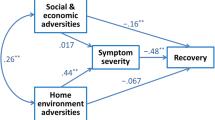Summary
This study examines the outcome of a social rehabilitation program for clients who were defined as socially disabled as a result of severe emotional disorder. Results indicate that a relatively successful subgroup was comprised of clients who had a psychotic diagnosis and a history of acute psychiatric hospitalization. An unsuccessful sub-group was comprised of clients who had neurotic and characterological diagnoses. They had no hospitalizations. This population we define as “silent disabled.” They present a life style of chronic social disability with attendant chronic marginal emotional compensation. This latter population typically does not receive mental health services. The needs for social rehabilitation are quite different for the two sub-groups. Observations of the differences between populations are presented along with suggestions for different social rehabilitation programs.
Similar content being viewed by others
References
Barrabee, P., Barrabee, E. L., Finesinger, J. E.: A normative social adjustment scale. Amer. Psychiat. 112, 252–259 (1955)
Bynder, H.: Sociology in a hospital: A case study in frustration. In A. Shostak (ed.) Sociology in Action, pp. 61–70 Homewood Illinois: Dorsey Press 1966
Campbell, D. T.: Reforms as experiments. Amer. Psychol. 24, 409–429 (1969)
Caro, F. G.: Approaches to evaluative research: A Review. Human Org. 28, 87–99 (1969)
Demone, H. W. Jr., Harshbarger, D.: A handbook of human service organizations. New York: Behavioral Publications 1974
Eaton, J. W.: Symbolic and substantive evaluation research. Admin. Sci. Quart. 6, 421–442 (1962)
Evans, J. W.: Evaluating social action programs. Soc. Sci. Quart. 50, 568–581 (1969)
Ferman, L. A.: Some perspectives on evaluatting social welfare programs. Anals. Amer. Acad. Pol. Soc. Sci. 385, 143–156 (1969)
Hansell, N., Benson, M. L.: Interrupting longterm patienthood: A cohort study. Arch. Gen. Psychiat. 24, 238–243 (1971)
Hasenfeld, Y., English, R. A. (eds.): Human services organization. Ann Arbor: Univ. Michigan Press 1974
Holland, W. E., Huntoon, H. D.: The evaluation of experimental social service delivery systems at the community level: An Organization Effectiveness View. Comm. Ment. Hlth. J. 10, 14–51 (1974)
Kandel, D. B., Williams, R. H.: Psychiatric rehabilitation: Some problems of research. New York: Atherton Press 1964
Karno, M., Schwartz, D. A.: Community mental health: Reflections and explorations. Flushing, New York: Spectrum Publ. 1974
Lamb, H. R. (ed.): Rehabilitation in community mental health. San Francisco: Jossey-Bass 1971
Lamb, H. R., Goertzel, V.: Discharged mental patients — are they really in the community? Arch. Gen. Psychiat. 24, 29–34 (1971)
Main, E. D.: A Nationwide evaluation of MDTA institutional job training. Hum. Resources 3, 159–170 (1968)
Marx, A. J., Test, M. A., Stein, L. I.: Extrahospital mangement of severe mental illness. Arch. Gen. Psychiat. 29, 505–511 (1973)
Meyer, H. J., Borgatta, E. F.: An experiment in mental patient rehabilitation. New York: Russell Sage Foundation 1959
Michaux, M. H., Chelst, M. R., Foster, S. A., Pruim, R. J., Dashinger, E. M.: Post-release adjustment of day and full-time psychiatric patients. Arch. Gen. Psychiat. 29, 647–651 (1973)
Piven, F. F., Cloward, R. A.: Regulating the poor: The functions of public welfare. New York: Pantheon 1971
Reich, R.: Care of the chronically mentally ill: A national disgrace. Amer. J. Psychiat. 130, 911–912 (1973)
Reich, R., Siegel, L.: Chronically mentally ill shuffle to oblivion. Psychiat. Annals. 3, 35–48 (1973)
Rossi, P. H.: Boobytraps and pitfalls in the evaluation of social action Programs. Proceed. Social Statistics Section pp. 127–132. American Statistical Association (1966)
Rossi, P., Williams, W. (eds.): Evaluating social programs. New York: Seminar Press 1972
Sanders, R., Smith, R. W., Weinman, B. S.: Chronic psychoses and recovery: An Experiment in Socio-Environmental Treatment. San Francisco: Jossey Bass, Inc. 1967
Schwartz, C. C., Meyers, J. D.: The outcome study in psychiatric evaluation research. Arch. Gen. Psychiat. 29, 98–102 (1973)
Schwartz, D. A.: Community mental health in 1972: An Assessment. In H. H. Barten and L. Bellak (eds.) Progress in Community Mental Health, Vol. II. pp. 3–34. New York: Grune and stratton, Inc. 1972
Sheldon, A.: An evaluation of psychiatric aftercare. Brit. J. Psychiat. 110, 662–667 (1964)
Silverstein, M.: Psychiatric Aftercare. Philadelphia: Univ. Pennsylvania Press 1968
Author information
Authors and Affiliations
Rights and permissions
About this article
Cite this article
Auerbach, E.D., Pattison, E.M. Outcome of social rehabilitation: Whom does it help?. Soc Psychiatry 11, 33–40 (1976). https://doi.org/10.1007/BF00578798
Issue Date:
DOI: https://doi.org/10.1007/BF00578798




